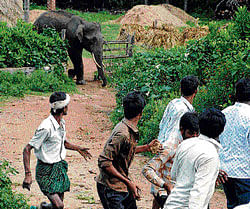
Addressing the gathering during a State-level workshop on extraction of non-timber forest produce, organised by the Western Ghats Task Force in Bangalore on Tuesday, Yogeeshwara said the department was making concerted efforts to mitigate the man-animal conflict.
He said that in compliance with the court’s direction, the forest department officials had visited South Africa and Kenya and studied the elephant translocation programme in the African countries.
The minister said the experiment had been successful in those countries and that the department would be submitting a report to the court on December 5 explaining the feasibility of the exercise.
The department had earlier proposed to shift the 25-odd elephants that have been isolated in the Alur range to the Cauvery Wildlife Sanctuary.
The court had, however, directed the department to consult experts, including the forest department officials, to reconsider the matter and find a suitable solution. The court had also opined that the department consult experts in African countries where elephants are translocated.
Yogeeshwara said the department was in the process of acquiring around 23,000 acres of revenue land, farmland and coffee plantation in and around Sakleshpur to restore the elephant corridor in that range.
Principal Chief Conservator of Forests, Wildlife, B K Singh said the court order had been misinterpreted, and that the court had not said it was opposed to shifting the elephants.
Singh has also written to the Union Ministry of Environment and Forests to establish contact with Kenya to have some experts sent over to Karnataka to study the Alur problem and recommend a suitable solution.